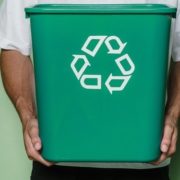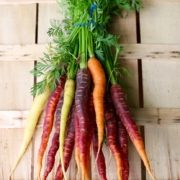Boxes of Unwrapped Fruit & Veg
France has banned plastic wrapping for the majority of fruit and vegetables, but we are led to believe that plastic helps to keep food fresher for longer. We know there is an urgent need to reduce the volume of single-use plastic used in food packaging but does loose produce sold straight from boxes simply increase food waste?
Plastic Packaging and Food Waste
In many supermarkets, there is the option to purchase either plastic wrapped or loose produce and conscious consumers are increasingly opting for loose. Having said this, food waste generates CO2, so it is useful to know if more food is wasted because it lacks a plastic wrap.
The sustainability charity WRAP has undertaken research to identify the impact of removing packaging on food waste. They focused their research on 5 products; apples, bananas, broccoli, cucumbers and potatoes. Their research identified that, contrary to popular belief, removing plastic can reduce food waste.
The main reason was that when pre-packaged, shoppers often buy more than they need. They grab a big bag of potatoes but don’t get through them all before they start to sprout and turn green. Inedible, they are thrown out. However, if shoppers select loose potatoes from the display box, they will take what they need and no more.
WRAP recommends that all producers and retailers sell fruit and vegetables loose unless they can evidence that plastic packaging does reduce food waste.
Best Before Dates on Produce Packaging
The other issue with packaging that the WRAP research revealed was the impact of Best Before dates. They discovered that perfectly edible produce was being thrown out because it was ‘out of date’. Shoppers were using this to inform their decisions, rather than using their sense of touch, smell and visual clues to identify suitability to eat.
WRAP determined that removing ‘best before’ from produce would help to cut food waste. When produce is sold loose, dates aren’t available and shoppers use their own judgement.
Promoting Food Storage Information
WRAP did identify that food storage played a greater factor in reducing food waste than plastic wrap. As an example, apples stored in the fridge at 4-degrees lasted over a month longer than those placed in a fruit bowl.
By educating shoppers on the best storage methods for the produce they purchase, food waste can be greatly reduced. This also ensures households get the most from their grocery spend.
The WRAP report summary informs producers and retailers about their Pathways 2025 – information and support to encourage the move away from plastic packaging.
Corrugated Cardboard Produce Trays
The ideal packaging to ship fresh produce from farm to shops is corrugated cardboard produce trays. These offer strong, non-toxic and sustainable packaging. They are lightweight, protective and stackable, making them ideal shipping boxes.
Corrugated cardboard is insulating, helping to keep produce at ambient temperatures and the fibres can absorb excess moisture, which maintains freshness. Many fruits, vegetables and flowers are picked before they are ripe and they need air to complete the ripening process. This is hindered in plastic wrap, however, the natural fibres of corrugated cardboard allow air to circulate.
Flexographic print can be applied to cardboard produce trays as part of the manufacturing process. This is a low-cost way to add colour, branding and designs to the box. We can also include die-cut handles to aid lifting and handling. The shelf-ready boxes add to the appeal of supermarket or farm shop displays.
When empty, the boxes can be flattered, collected for recycling and reprocessed into new boxes within weeks. This sustainable process helps to minimise the environmental impact of fresh produce packaging.
Aylesbury Box Company manufacture produce trays for fruit, vegetables and flowers to the exact size requirements that producers require. Get in touch with our team on 01296 436888 or enquiries@abcbox.co.uk to discuss the options for printed cardboard produce trays.





